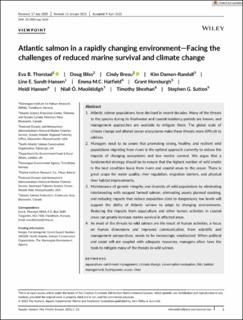Atlantic salmon in a rapidly changing environment—Facing the challenges of reduced marine survival and climate change
Thorstad, Eva Bonsak; Bliss, Doug; Breau, Cindy; Damon-Randall, Kimberly; Sundt-Hansen, Line Elisabeth Breivik; Hatfield, Emma M.C.; Horsburgh, Grant; Hansen, Heidi; Maoiléidigh, Niall Ó.; Sheehan, Timothy F.; Sutton, Stephen G.
Peer reviewed, Journal article
Published version

Åpne
Permanent lenke
https://hdl.handle.net/11250/2987106Utgivelsesdato
2021Metadata
Vis full innførselSamlinger
- Publikasjoner fra CRIStin - NINA [2364]
- Scientific publications [1392]
Sammendrag
1. Atlantic salmon populations have declined in recent decades. Many of the threats to the species during its freshwater and coastal residency periods are known, and management approaches are available to mitigate them. The global scale of climate change and altered ocean ecosystems make these threats more difficult to address. 2. Managers need to be aware that promoting strong, healthy, and resilient wild populations migrating from rivers is the optimal approach currently to reduce the impacts of changing ecosystems and low marine survival. We argue that a fundamental strategy should be to ensure that the highest number of wild smolts in the best condition leave from rivers and coastal areas to the ocean. There is great scope for water quality, river regulation, migration barriers, and physical river habitat improvements. 3. Maintenance of genetic integrity and diversity of wild populations by eliminating interbreeding with escaped farmed salmon, eliminating poorly planned stocking, and reducing impacts that reduce population sizes to dangerously low levels will support the ability of Atlantic salmon to adapt to changing environments. Reducing the impacts from aquaculture and other human activities in coastal areas can greatly increase marine survival in affected areas. 4. As most of the threats to wild salmon are the result of human activities, a focus on human dimensions and improved communication, from scientific and management perspectives, needs to be increasingly emphasized. When political and social will are coupled with adequate resources, managers often have the tools to mitigate many of the threats to wild salmon. aquaculture, catchment management, climate change, conservation evaluation, fish, habitat management, hydropower, ocean, river
